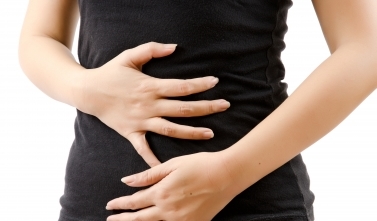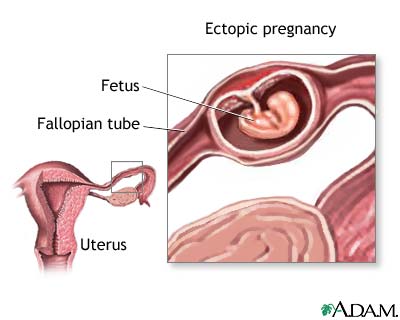Pregnancy Signs and Possible Complications
We inform, you decide.
Early Pregnancy Symptoms1
Delay/Difference in Menstruation
A delayed or missed menstruation is the most common pregnancy symptom leading a woman to test for pregnancy. When you become pregnant, your next period should be missed. Many women can bleed while they are pregnant, but typically the bleeding will be shorter or lighter than a normal period.
Other Explanations: Excessive weight gain/loss, fatigue, hormonal problems, tension, stress, ceasing to take the birth control pill, or breast-feeding.
Spotting
Implantation bleeding can be one of the earliest pregnancy symptoms. About 6-12 days after conception, the embryo implants itself into the uterine wall. Some women will experience spotting as well as some cramping.
Other Explanations: Actual menstruation, altered menstruation, changes in birth control pill, infection, or abrasion from intercourse.
Swollen/Tender Breasts
Swollen or tender breasts is a pregnancy symptom which may begin as early as 1-2 weeks after conception. Women may notice changes in their breasts; they may be tender to the touch, sore, or swollen.
Other Explanations: Hormonal imbalance, birth control pills, impending menstruation (PMS2) can also cause your breasts to be swollen or tender.
Fatigue/Tiredness
Feeling fatigued or more tired is a pregnancy symptom which can also start as early as the first week after conception.
Other Explanations: Stress, exhaustion, depression, common cold or flu, or other illnesses can also leave you feeling tired or fatigued.
Nausea/Morning Sickness
This well-known pregnancy symptom will often show up between 2-8 weeks after conception. Some women are fortunate to not deal with morning sickness at all, while others will feel nauseous throughout most of their pregnancy.
Other Explanations: Food poisoning, stress, or other stomach disorders can also cause you to feel queasy.
Backaches
Lower backaches may be a symptom that occurs early in pregnancy; however, it is common to experience a dull backache throughout an entire pregnancy.
Other Explanations: Impending menstruation, stress, other back problems, and physical or mental strains.
Headaches
The sudden rise of hormones in your body can cause you to have headaches early in pregnancy.
Other Explanations: Dehydration, caffeine withdrawal, impending menstruation, eye strain, or other ailments can be the source of frequent or chronic headaches.
Frequent Urination
Around 6-8 weeks after conception, you may find yourself making a few extra trips to the bathroom.
Other Explanations: Urinary tract infection, diabetes, increasing liquid intake, or consuming excessive diuretics.
Darkening of Areolas
If you are pregnant, the skin around your nipples may get darker.
Other Explanations: Hormonal imbalance unrelated to pregnancy or may be a leftover effect from a previous pregnancy.
Food Cravings or Aversions
While you may not have a strong desire to eat pickles and ice cream, many women will feel cravings for certain foods when they are pregnant. You may also find yourself avoiding foods you normally like. This can last throughout your entire pregnancy.
Other Explanations: Poor diet, lack of a certain nutrient, stress, depression, or impending menstruation.
Mood Swings
Hormonal changes that occur during pregnancy can create changes in mood ranging from elation to extreme sadness. These emotional fluctuations are completely normal emotions and severity can vary from woman to woman. If you find you are experiencing a prolonged period of depression or anxiety, contact your healthcare provider.
Other Explanations: Stress, depression, or impending menstruation.
Symptoms of Possible Complications
If you think you may be pregnant and are experiencing any of the following physical problems, call your doctor or go to the emergency department right away:
- Vaginal bleeding of any amount
- Abdominal pain with a fever
- Cramping and abdominal pain more than your period
- Burning with urination
- Puffiness in your hands or face
- Excessive vomiting
Any of the above symptoms could indicate serious complications and must be addressed by a medical professional immediately.

Pregnancy begins at conception, when an egg is fertilized by the sperm. Conception usually occurs in the fallopian tube. In a healthy pregnancy the zygote implants somewhere in the uterine wall. In an ectopic pregnancy, the fertilized egg (zygote) most commonly implants in the fallopian tube. However, ectopic pregnancy can also occur in the ovary, the abdomen, and the cervical canal (the opening from the uterus to the vaginal canal). The phrases tubal pregnancy, ovarian pregnancy, cervical pregnancy, and abdominal pregnancy refer to the specific area of an ectopic pregnancy.1

In the early stages, symptoms may be the same as with any normal pregnancy, including missed period, swollen or tender breasts, increased fatigue, nausea, and increased urination. However, as the pregnancy progresses, the embryo may outgrow its surroundings causing pelvic or abdominal pain and sometimes light-headedness or fainting. It’s important to always follow up a positive home pregnancy test with your health care professional to ensure that the pregnancy is normal. An ultrasound can be performed to confirm the presence of a fetal sac in the uterus.
Ectopic pregnancies are not viable, meaning they cannot naturally continue, and if not addressed could cause serious harm or death to both the mother and child. Surgery is required to remove the fetus and repair or remove any damaged surrounding tissues. If not caught early, ectopic pregnancies can cause internal hemorrhaging and may be fatal. Fortunately, ectopic pregnancies are rare and occur in only approximately 1% of pregnancies (Ectopic Risk).
What if I’ve Been Using Drugs?
The illicit use of drugs – prescription, over-the-counter or illegal – during pregnancy can greatly affect the health of both the fetus and the mother. If you’ve been using drugs and are pregnant, contact your health care provider right away.

Maternal Risks
- Studies show that women who use illegal drugs such as heroine, cocaine or marijuana during pregnancy are more likely to have sexually transmitted diseases, such as syphilis, gonorrhea, hepatitis and HIV. STD’s pose serious risks to the mother, including damage to reproductive organs, compromised future fertility, cancers, and even death.
- Women who use street drugs are also more likely to have pregnancy-related bleeding, and other pregnancy complications.3
- Women who smoke are twice as likely to experience premature rupture of membranes (water breaks early), placental abruption, and placenta previa during pregnancy.4
Fetal Risks
- In-utero drug exposure can result in delayed fetal development, nutritional deficiencies, hypertension, life-threatening vascular issues and spontaneous abortion.5
- Infants who are born to women who abuse drugs, including alcohol and tobacco, are at a greater risk for withdrawal symptoms, delayed social development, congenital malformations, SIDS,6 and FAS.7
- Because of the potential consequences to the unborn, 15 states actually consider substance abuse during pregnancy child abuse.8
If you’re pregnant and concerned about your use of drugs, contact us for a free consultation.
Personalized Care
Jenna thinks she’s pregnant. But before she can make a decision about her pregnancy, she begins to experience cramping and light bleeding. She wonders, is she miscarrying or is this a normal part of the early stages of pregnancy? Is there still time to decide whether she wants to keep the baby? Like many women in a highly private situation like Jenna, the first instinct is to search online for answers. However, the opinions and experiences of other women, no matter how similar, cannot take the place of a personal examination by a caring professional.
Each woman and each situation is unique and deserves special care and consideration. Schedule your free appointment with CompassCare today.

Medically Reviewed By:
STAFF NURSE, ROCHESTER
JOHANNA G, MS, RN
1 American Pregnancy Association (2019). Early Signs of Pregnancy. Retrieved June 2021 from http://www.americanpregnancy.org/gettingpregnant/earlypregnancysymptoms.html
2 Premenstrual Syndrome
3 Guttmacher Institute. (2011). Perspectives on Sexual and Reproductive Health. Volume 34, Number 4, July/August 2002. Prenatal Cocaine and Opiate Use Are Linked to a Wide Variety of Health Hazards. Retrieved from: http://www.guttmacher.org/pubs/journals/3421802.html
4 Centers for Disease Control and Prevention. (2011). Tobacco Use and Pregnancy. What do we know about tobacco use and pregnancy? Retrieved from: http://www.cdc.gov/reproductivehealth/tobaccousepregnancy/
5 Archives of Women’s Mental Health. (1999). Volume 2, Number 2, 57-65, DOI: 10.1007/s007370050037. Pregnancy and substance abuse. Review Article abstract. G. Fischer, M. Bitschnau, A. Peternell, H. Eder and A. Topitz. Retrieved from: http://www.springerlink.com/content/h9drvm1c9t3dw4ym/
6 Mayo Clinic. (2011). Sudden infant death syndrome (SIDS); Risk Factors. Retrieved from: http://www.mayoclinic.com/health/sudden-infant-death-syndrome/DS00145/DSECTION=risk-factors
7 Mayo Clinic. (2011). Fetal alcohol syndrome. Retrieved from: http://www.mayoclinic.com/health/fetal-alcohol-syndrome/DS00184
8 Guttmacher Institute. (2011). State Policies in Brief. Substance Abuse During Pregnancy. Retrieved from: http://www.guttmacher.org/statecenter/spibs/spib_SADP.pdf